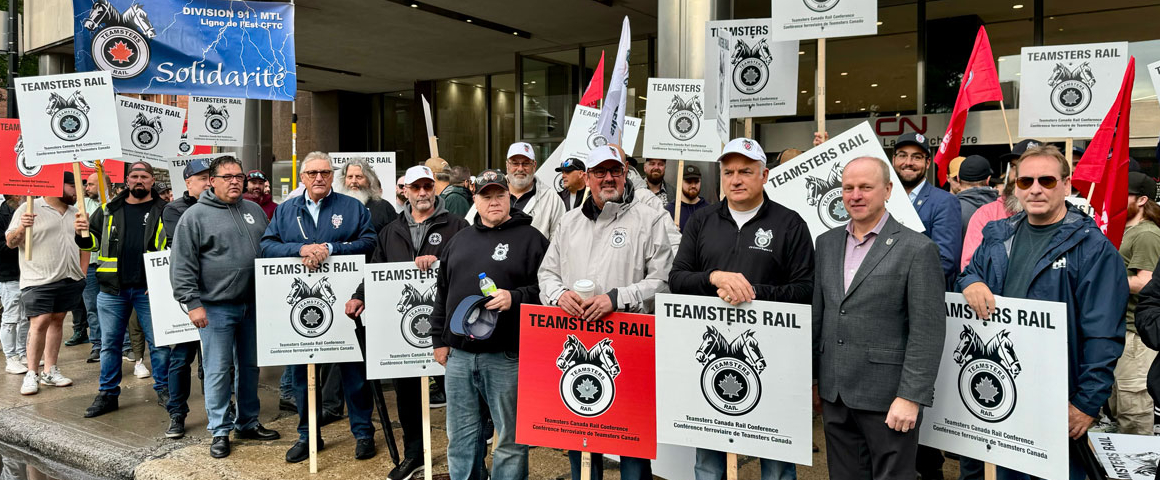By Dave McKee
Some 9,300 rail workers at Canadian National (CN) and Canadian Pacific Kansas City (CPKC) are heading back to work following government intervention which has effectively denied their labour rights. But the corporate panic has revealed just how much power rail workers wield.
Negotiations were prolonged, partly by the corporations’ aggressiveness but also by government interference. On May 9, then federal Minister of Labour Seamus O’Regan asked the Canada Industrial Relations Board (CIRB) to determine whether any shipments handled by the railways would be considered “essential” and must continue in the event of a work stoppage. That move prevented the start of any strike or lockout until after the board made a ruling, effectively suspending workers’ right to strike.
Emboldened by the government’s interference, CN and CPKC dug in on their concessionary demands on a wide range of issues including crew scheduling, hours of work and fatigue management, through which they want to squeeze longer work hours and more availability out of rail workers.
The CIRB ruled on August 9 that a stoppage would not result in an immediate and serious danger to the safety or health of the public, thereby confirming (sort of) the workers’ right to strike. The board also mandated a “cooling off period” which pushed the strike/lockout date to August 22.
One of the things that is interesting in all of this is the level of corporate and government panic around the possibility of a rail strike at one or both of the country’s main carriers.
Throughout negotiations, resource and agricultural corporations repeatedly sounded the alarm about the devastating impact a strike would have on their industries and the economy in general. (Notably, they only ever talked about the impact of a strike, never a lockout.)
The federal government, ever loyal to corporate Canada, quickly stepped in with the “essential service” request to the CIRB. This was coupled with numerous public comments about the economic impact of a strike, the anti-labour sentiments of which were always echoed by the opposition Conservatives and by right-wing premiers across the country.
Following the CIRB ruling and the resumption of negotiations, new Labour Minister Steve MacKinnon and federal mediators began meeting with the union and companies. Hours before the strike/lockout deadline, Justin Trudeau chimed in to implore against a stoppage.
Trudeau’s statement came on the heels of a joint statement from the presidents of the US and Canadian Chambers of Commerce, pleading with the government to intervene.
This all indicates the incredible power that rail workers have. The Grain Growers of Canada estimates that farmers in western Canadian alone would lose $50 million a day during a stoppage. So, just for that one industrial sector, those 9,300 rail workers each have a daily economic impact of about $5,400 – very impressive, but no doubt a far cry from what they earn in any given work day.
When we look at the overall flow of goods through the two railways – estimated at $1 billion per day – the economic impact per worker leaps to nearly $108,000 every 24 hours.
These are figures reminiscent of the 13-day BC Port strike in 2023, when 7,400 workers laid down their tools and delivered an estimated $9 billion body check to the economy.
It’s an important reminder of the power that workers hold, as the creators of all wealth in this society. It also shows that, when workers unite and struggle collectively, they wield much more power than either corporations or government would like. And if they use that power, they can win big gains for the working class as a whole.
It’s like the song says, “Without our brain and muscle, not a single wheel would turn…”
Support working-class media!
If you found this article useful, please consider donating to People’s Voice or purchasing a subscription so that you get every issue of Canada’s leading socialist publication delivered to your door or inbox!
For over 100 years, we have been 100% reader-supported, with no corporate or government funding.




